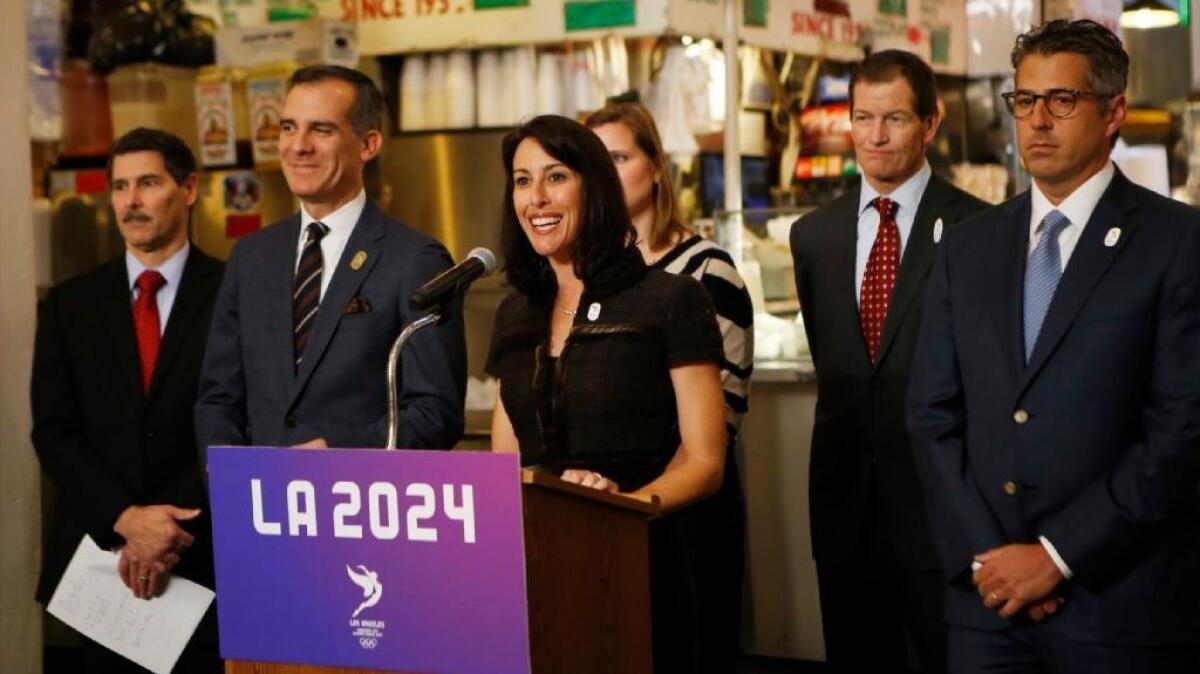LA 2024 committee says it has a plan to protect taxpayer dollars in hosting the Olympics

The leader of a private committee bidding to bring the Summer Olympics back to Los Angeles appeared before city officials Friday to once again face questions about whether the multibillion-dollar sporting event might pose a threat to taxpayer dollars.
Gene Sykes, chief executive of LA 2024, spent much of the City Hall meeting talking about safeguards that would include multiple insurance policies and a large contingency fund.
Speaking to a Los Angeles City Council committee, Sykes described the plan as âprudent, realistic and designed to protect taxpayers.â
While Sykes spoke at length about finances, he side-stepped another question: Will bid leaders shift opening and closing ceremonies from the Coliseum to the new NFL stadium in Inglewood?
âWeâre not in a position to say what weâre doing with the Rams stadium yet,â Sykes later told reporters. âIf we have something to say, weâre going to say it as soon as we have it all wrapped up.â
While a move is expected, the Coliseum seems likely to remain involved in the ceremonies in some way.
Sykes would say only: âJust stay tuned.â
Los Angeles is competing against Paris and Budapest for 2024, with the International Olympic Committee voting to select a host in September.
Final candidate submissions, which include a venue list, are due next month. At the same time, LA 2024 must finalize an MOU â a memorandum of understanding â detailing its working relationship with the City Council if the bid succeeds.
The city has a financial stake because it must sign an IOC contract promising to settle any remaining debt if organizers run out of money. Past Olympics have left cities such as Athens with significant deficits.
L.A.âs bid has sought to economize by making use of existing stadiums and arenas, including Staples Center, Pauley Pavilion and the Rose Bowl.
Bid leaders estimate the Games would cost $5.3 billion, an amount they say would be covered by revenue from sources such as broadcast rights, corporate sponsorships and ticket sales.
Sykes reiterated that organizers would take a layered approach to protecting public money by purchasing multiple insurance policies and setting aside $491 million for unforeseen costs.
City staff told council members the contingency fund serves as a âwarning bellâ â if organizers burn through the first $241 million, they must consult with the City Council on further expenditures.
But if organizers were to go bankrupt, the city would be responsible for the next $250 million and the state has pledged to pay $250 million after that. All remaining debt would revert back to the city.
On Friday, council members expressed confidence in LA 2024âs plan to adhere to a balanced budget.
âI think weâve come up with a product we all can live with,â Council President Herb Wesson said.
As for the ceremonies, LA 2024 originally proposed using a refurbished Coliseum. The return of the Rams, with construction beginning on a $2.6-billion stadium, presented another option.
Switching venues would allow L.A. to place a shiny, new jewel before IOC voters and might erase any âbeen there, done thatâ image of a city that has hosted the Games twice before.
The potential change faced initial resistance.
âCall me a homer for the Coliseum, but I think that the place that was the host of the last two Los Angeles opening ceremonies and closing ceremonies is a pretty damn good place for the next one,â Councilman Paul Krekorian told a public forum last week.
The mood appeared to soften Friday, with council members asking few questions on the issue. Though the proposed MOU would require a council vote on moves outside the city, the final bid is expected to showcase Inglewoodâs new stadium.
Sharon Tso, the cityâs chief legislative analyst, told the committee: âI would anticipate that as part of this collaborative working relationship that weâve developed ⦠LA 24 would actually come forward and work with each member of the council in laying the groundwork in terms of why a change might be necessary.â
Follow @LAtimesWharton on Twitter
More to Read
Go beyond the scoreboard
Get the latest on L.A.'s teams in the daily Sports Report newsletter.
You may occasionally receive promotional content from the Los Angeles Times.







